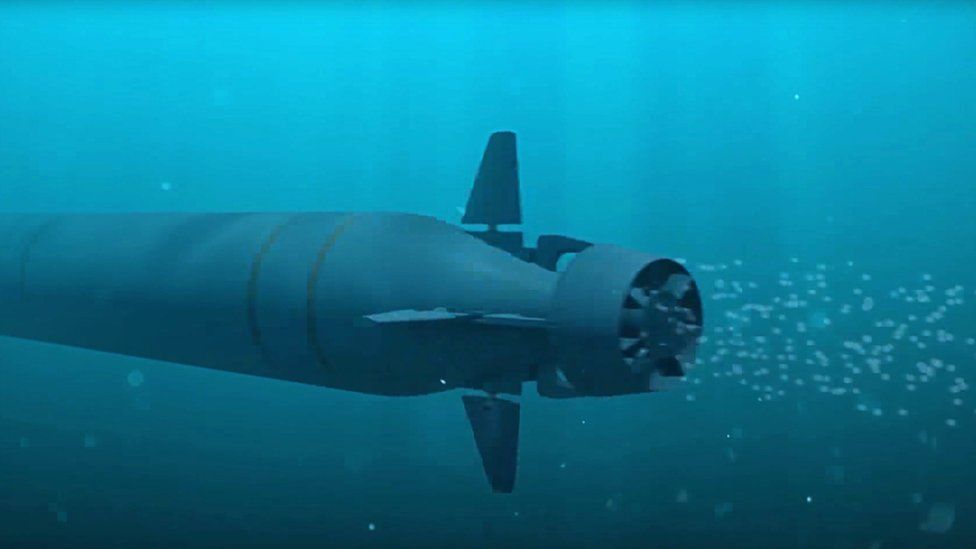On Sunday, President Putin ordered his military to move Russia’s “deterrent forces” – which include nuclear weapons – to a “special mode of combat duty”. But what exactly does that mean?
It is not entirely clear, Western analysts say. UK officials say that the language Putin used did not quite fit with their understanding of the alert levels for Russian nuclear weapons.
Some think Putin was ordering a move from the lowest alert level, “constant”, to the next level up, “elevated”, (with “military danger” and “full” still above) but that was not certain. Each move increases readiness for weapons to be used.
Many though have interpreted the move primarily as a form of public signalling, rather than indicating a real intent to use such weapons, which Putin knows will bring nuclear retaliation by the West. UK Defence Secretary Ben Wallace has indicated that he believes the announcement was primarily “rhetoric”.
That does not mean there are no risks and the situation is likely to be watched closely.
Was it a new warning?
Last week, Putin had warned in more coded language that if other countries interfered with Russia’s plans they would face consequences the “like of which they have never seen”. That was widely interpreted as a warning for Nato not to become directly militarily involved in Ukraine.
Nato has always been clear it will not do that, knowing it could trigger direct conflict with Russia which could escalate into nuclear war. Sunday’s warning was more direct and public.
Why the new warning?
Putin said the move was in response to “aggressive statements”. On Monday, the Kremlin said this referred to statements by Western officials, including UK Foreign Secretary Liz Truss, about possible clashes and confrontations with Nato. Western officials also believe the new warning has come because Putin may have miscalculated over Ukraine.
He may have underestimated how much resistance he would face on the battlefield in Ukraine. And he underestimated how far the West would unite in a tough response with sanctions. That has left him reaching for new options and tougher talk.
“This is a sign of anger, frustration and disappointment,” one recently retired British general told me.
The US Ambassador to the UN Linda Thomas-Greenfield suggested this language is part of Putin’s effort to justify the war in Ukraine by claiming it is not an aggressor but the one under threat and seeking to defend itself.
Seen in this way, the nuclear alert is a way of emphasising this message to his own people. Another way of seeing it is that Putin is worried about Western plans to provide military assistance to the Ukrainians and wants to warn them about not doing too much.
Another is that he is worried sanctions, which he referenced in his announcement, are designed to cause unrest and overthrow his government. But the overall message seems to be a warning to Nato that if it becomes directly involved events could escalate.

Russia attacks Ukraine: More coverage
- LIVE: Latest updates from on the ground
- THE BASICS: Why is Putin invading Ukraine?
- ZELENSKY: Comedian president rises to the moment
- MAPS: Tracking day four of Russia’s invasion

What are the risks?
Even if Putin’s threat is meant as a warning rather than signalling any current desire to use the weapons, there is always the risk of miscalculation if one side misinterprets the other or events get out of hand.
A concern is that Putin has become isolated and out of touch, with few of his advisers willing to tell him the truth. Some fear his judgement is becoming erratic. Some hope though that if he did go too far, others further down the chain of command might not be willing to carry out orders. The risks of any nuclear conflict may have gone up slightly but they still remain low.
How is the West responding?
So far, Western governments have been careful not to further escalate either rhetoric or the action. The US military has its own defence readiness alert status known as Defcon, and today White House Press Secretary Jen Psaki said there was “no reason to change” its nuclear alert levels at the moment.
The UK has nuclear armed submarines at sea and is also unlikely to say anything publicly. The aim appears to be to treat the Russian statement as bluster and not increase tensions by appearing to take it too seriously or take any actions which might spark a Russian response.
This is not currently a nuclear crisis and it must not become one, Western security officials say.
Will the West know what Russia is doing?
UK Defence Secretary Ben Wallace told the BBC that the UK had not seen any change yet in the actual posture of Russia’s nuclear weapons. That will be watched closely, intelligence sources confirm.
During the Cold War, a huge intelligence machine was created in the West to watch Moscow’s nuclear arsenal. Satellites, intercepted communications and other sources were analysed to look for any signs of changes in behaviour – like preparing weapons or crews for bombers – that would offer warning.
Much of that remains in place and the West will be now watching Russian activity closely to understand if there is going to be any significant change in behaviour. There has been no sign, so far.


























